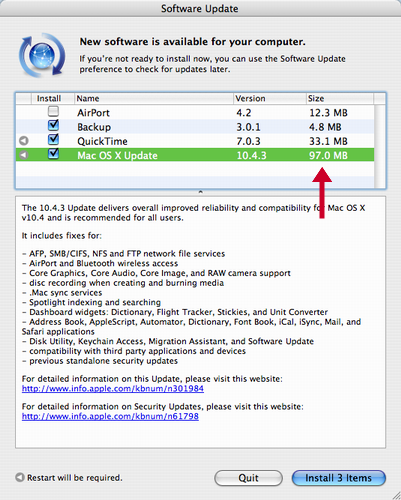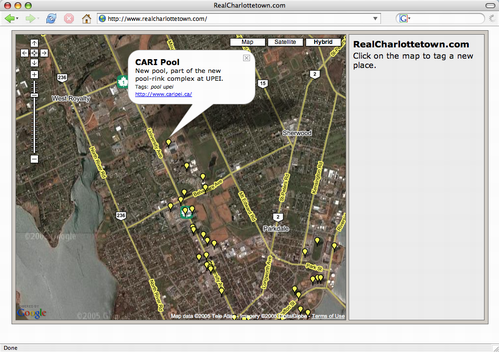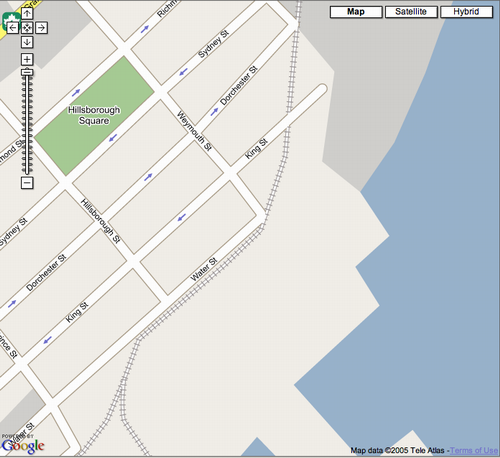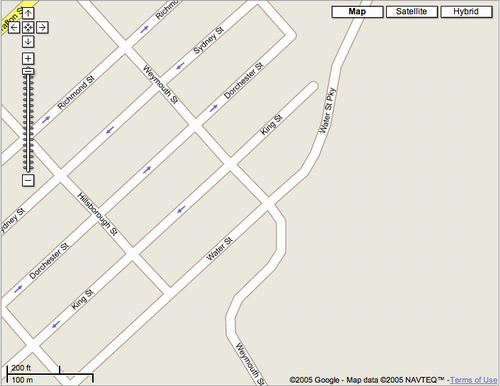My friend Ann Thurlow helpfully pointed out to me this evening that the poppy that we wear leading up to Remembrance Day on November 11 is supposed to be worn on the left-hand side of the body, over the heart. Up until that point I’d simply assumed that any old jaunty place would suffice.
As such I offer an apology to any veterans and others whom I’ve offended during the 38 previous Remembrance Day periods I’ve lived through when there’s been a 50% chance that I’ve had it wrong.
For the complete rundown, see this helpful Veterans Affairs Canada page, which includes:
The Royal Canadian Legion suggests that the Poppy be worn on the left lapel of a garment or as close to the heart as possible.
I realized this evening that it has been 21 years since 1984. I can remember 1984. Very clearly. And 21 years before I was born in 1966 was the end of World War II. That kind of thinking kind of compresses the time stream.
The latest update for OS X, 10.4.3, arrived on the scene today. It’s a 97MB download. That’s 5x more data than the entire hard disk on the first computer I owned that had a hard disk, and would take up approximately 70 floppy disks if it was distributed old school. Amazing.

Here’s a complete rundown on the changes included in the update.
Next up in the Google Maps experimenting game is RealCharlottetown.com, an annotated map of the City of Charlottetown.
The idea is this: take a Google Map, and wrap around it a simple “tag this place” interface that lets anyone associate a geographic location with a name, some tags, a URL and a description. Think of it as “Plazes for ditches.”

This is still a very, very beta-quality application, but it does work, and you’re free to tag all the places you like.
Some important things to note:
- As described here, the Tele Atlas map layer for the Charlottetown area is somewhat out of date; you’ll notice this particularly when you’re browsing in the “hybrid” view — sometimes the roads don’t line up with the satellite imagery.
- Still to come are things like an RSS feed of newly tagged places, XML export of all places, browsing the map by tag, etc. Stay tuned.
- No way to edit or enhance already-tagged places yet.
- The user interface, especially the visual indication of where you’re tagging a new place, needs some work.
- It seems to work in Internet Explorer for Windows, but I haven’t tested extensively.
Comments welcome.
I’m developing a follow-up application to the Interactive Charlottetown Bus Map that also uses the Google Maps API. During my experimenting, I started to notice that in the “hybrid” view, where the API returns a satellite map overlaid with a map, the streets in “reality” weren’t lining up with the streets on the map. It seems, however, that this isn’t a problem with Google’s own implementation of Google Maps. Witness the following examples:

The map above is a screen snap of my application, which uses the Google Maps API. If you know Charlottetown, you’ll realize that the map information is out of date, showing railway tracks where none are, and not showing the addition to Water Street that was completed several years ago. Looking at the same area on Google’s own site shows a different, more up to date, data set:

Notice how the railway tracks are gone and Water Street is extended. Additionally, in the “hybrid” view the streets in Google’s map “line up” with the satellite streets much better.
Am I missing something here? Do I need to flip a switch that I’m not flipping, or is Google simply serving more up-to-date maps for their own maps then they are for third-parties using the API?
For the second time in as many weeks I’ve received an email request for permission to use photographs I’ve posted to the web in other media.
First it was a request to use some of my photos of the 2004 U.S. election in the film Who Kidnapped My Vote.
Today came a request to use some of my photos of the Grand Canyon in the next edition of Landscape Architecture: A Manual of Site Planning and Design.
I’m fairly confident that I’m not a good photographer. And I’m certainly not religious about taking and posting photographs. In both cases I’ve given the okay to use the photos. Makes me wonder what would happen if independent pro photographers started exposing their entire stock library to Google.
Back in June, after reboot, I had the pleasure of having dinner with Doc Searls, Nikolaj Nyholm and his wife and kids, Laurent Haug and Ben Cerveny.
During the dinner, conversation turned to the history of reboot, its connection to Zap Your PRAM, and to the notion of “people holding their own conferences” in general.
Laurent, in particular, seemed taken with the idea of having his own conference, and may have even said something to the effect of “well, I guess I’ll have to have my own conference then.” In any case, “Laurent Haug’s conference” has been on my travel page for many months, waiting for something to develop.
And now it has. Today Laurent announced the Lift conference, to be held in Geneva on February 2 and 3, 2006. I’m already searching around for air tickets, as Laurent has promised to come to Zap3 if I come to Lift (that can be considered a broad hint that you should watch out for Zap3 announcements Real Soon Now).
Olle Jonsson has taken the wrapping off OlleOlleOlle, his tiny new company.

Remember back two years ago when we were talking about how web shops propagandize themselves? Well Olle’s self-description deserves some sort of award for brevity and pith:
Publishing on the web is supposed to be easy. Supposed, huh? Well, sometimes it is, sometimes you need help.
My name is Olle Jonsson and my company is here to provide that extra guy, a tech-savvy non-employee for hire. When you need it. I help out with PHP, MySQL, blogging, CMSes, and more.
What I do is the technical side of a publishing effort. Not the pictures, not the fonts, not the writing. The content and the design decisions are yours to make.
How do you hire me, then? Find out more…
Not only that, but he publishes his mobile phone number and his hourly rate out there in public (note to self: need to charge more).
Olle and the rest of the Danonerds are geek dining tonight.
Janice Stillman, Editor of The Old Farmer’s Almanac, passed along a clipping from the Wall Street Journal when we were visiting Yankee earlier in the month, and I had a chance to sit down and read it yesterday. It was one of Walt Mossberg’s columns and it talked about AskMeNow.com.
Of course I had to try it out. I did. It’s neato.
Here’s how it works: you go to AskMeNow.com and register. It’s free, and all you need to hand over is your name, ZIP code, country and your mobile phone number (it’s a mobile phone-based service, so it’s not much good without this).
Once you’re registered, you then simply call (585) 419-0412 from your mobile phone and, when prompted, you speak a question that you want to have answered.
Wait a few minutes — anywhere from 2 to 5 in my tests — and the answer comes back to you as an SMS text message.
Here are the tests we ran last night:
- What is the population of Prince Edward Island? The population of Prince Edward Island is 137,800. People from Prince Edward Island are called Prince Edward Islanders (or colloquially just Islanders).
- How many toes does an African elephant have? The African elephant has only four toes on the front feet and three on the back.
- What is the average length of needles on a blue spruce tree? The Blue Spruce tree growing to 25-30 m tall and the leaves are needle-like 15-30 mm long.
- What years did the television program Melrose Place run? No answer provided.
For the last question, about Melrose Place, I got back a text message saying that my question couldn’t be answered.
Because How Rogers ‘Email to Text’ Just Plain Sucks, using AskMeNow.com with a Rogers Wireless phone is somewhat inconvenient, as answers are actually send by email to the mobile phone which, under Rogers “helpful” system, requires sending back an SMS reply to Rogers confirming that you actually want to read the email.
Still, though, the system seems to work pretty well and in situations where quick factual answers to quick factual questions are required away from the Internet, I can see it being useful. If nothing else, it’s a reason for mobile phones to be banned from trivia Sundays this winter at Cedars.
How does this work? Mossberg’s column explains that questions are sent to the Philippines where real people listen to them and then use the Internet and other data sources to look up the answers.
It’s a rare Friday morning that I’m up and alive by 8:00 a.m., so I’m not a regular listener to the Island Morning Friday morning “political panel,” a discussion among Nancy Key, Paul MacNeill and Ross Young about Island politics. But if this morning’s example was typical, I’d say it’s time for a new crew, as all I heard was 10 minutes of content-free personal sniping and inside jokes.
Yes, rapport is important. But this is a case where there’s either too much rapport or too little. In any case, it simply wasn’t good radio.
By the way, this morning’s show also marked the exit of Barbara Nymark from the CBC. I first met Barbara almost 10 years ago when Catherine, Steve and I crashed the CBC’s “feed our advertisers lobster so they advertise more” night, and we found we had both a family doctor and a automobile (Nissan Sentra wagon) in common. Since then we’ve worked together a few times, usually when some burning technology issue has popped up in the headlines. I’ve always enjoyed working with her, and wish her the best in retirement.
From Olle comes a pointer to Kiva:
Kiva provides a new, sponsor a business option for individuals to connect with small enterprises in developing countries through flexible loans.
Although I’ve never found myself in sympathy with the “hand up not a hand out” rhetoricians, I find myself struck by the simple elegance of the Kiva proposition. Ironically, they have no businesses to loan to at present, and I don’t find myself moved to make a donation to “provide more loan opportunities into the future.”
 I am
I am